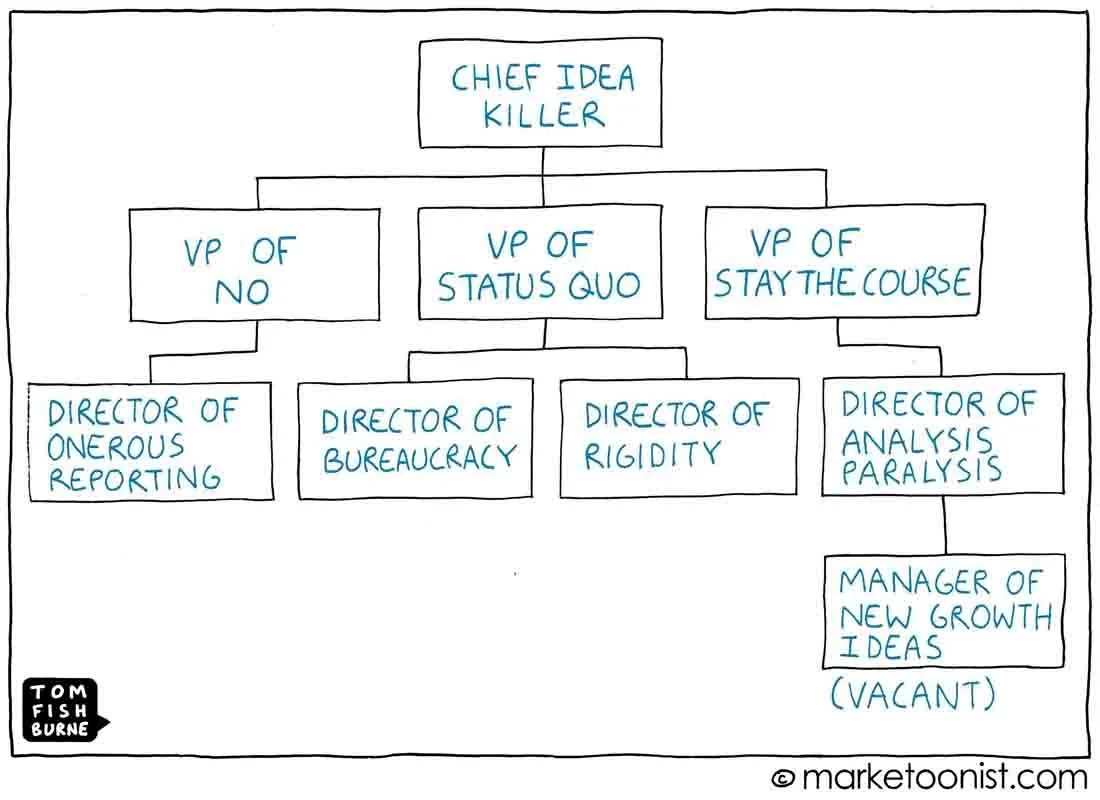Rebels At Work: Control is for Amateurs
We came across this graphic the other day and it reminded us of something we observed a few years ago. Control is for amateurs. This usually applies to new managers, who often default to micro-managing their team lest a mistake get made that will reflect badly on them. Probably almost all managers start out this way but the good ones learn quickly that a better route is to trust your colleagues. But Rebels at Work can also suffer from the desire to control others, sometimes out of insecurity and sometimes because it’s just too hard to let others be the ones to implement your dream.
Then there’s this:
This chart has been around for more than a decade, and oddly enough not much has changed. Organizational charts, budgets, and calendars are a much truer indicator of strategy than any mission and vision statement. Trust us. (This just in: A friend on LinkedIn just wondered where the CWTOO was—Chief Wait Them Out Officer.)
For your night table…
The spring brought a whole slew of new books of potential interest to rebels. Lois reviewed card-carrying rebel Celine Schillinger’s new book, Dare to Un-lead, on our blog.
Another interesting new book is by Zoe Chance, Influence is Your Superpower. Dr. Chance teaches the most popular course at the Yale School of Management and she offers practical ideas about how to get people to say yes. I particularly enjoyed how she emphasized the importance of gaining followers:
The success of great ideas depends on enthusiastic allies. Your efforts to find, empower and motivate them will go much further than your efforts to overcome people’s resistance.
And she offers a compelling way to think about objections to your ideas. Dr. Chance asks you to consider whether people experience your big ideas as an invitation. Most people when they’re hosting an event think hard about how to make people comfortable and meet their needs. What if instead of thinking of making change, you imagined your task as HOSTING CHANGE? How would you adjust your approach?
From the Blog…
In addition to the review of Dare to Un-Lead, we wrote in May about how Rebels at Work need to continuously learn. We’re still learning, most recently about the strategic leverage of adjacency.
An innovation leader recently offered an interesting rule of thumb. She only pursues new ideas that are “one adjacency removed” from her company’s core business areas. This concept is actually similar to our advice that rebels find a way to tuck their new ideas within the value framework of their organization. Is there something that the executive suite cares about that your idea contributes to? Hijacking the status quo’s values to advance new ideas always provides an easier path forward.
And be sure to check out a guest blog about the challenges of returning to the office.
Other Great Ideas
We run across any number of fun ideas and astute observations, most of which we share on Twitter on our @rebelsatwork stream. A quick selection—there are many more:
What to do when work forces you to compromise with your morals.
Moral injuries can leave lasting impacts on our psyche, but they don’t have to remain debilitating. Like other trauma and hurt, we can grow from them. We can find the resilience we need to rise above the injury and restore our moral centers. Sometimes we’re able to take the environments along on that journey, and sometimes we have to leave them. Either way, if you’re carrying the weight of moral injury, don’t wait until it overtakes your whole outlook on life, and yourself. Find the courage to face what you’ve experienced and done, and with it, reclaim the values you hold most dear.
Practical advice on becoming a better listener. We’ll say it over and over again. The easiest way to improve your communication skills is to become a better listener.
We don’t need any more fake smiles. A good piece on the importance of emotional diversity at work.
And this piece diagnosing why change just doesn’t happen. The author is talking about the British Army, but he could be talking about the company you work for. “The platitudes of change have become a drop-down selection in our senior leaderships' speeches.”






